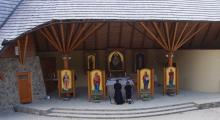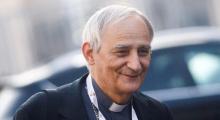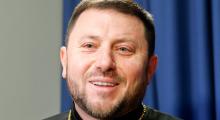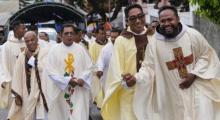Issued by the Catholic Center for Studies and Media - Jordan. Editor-in-chief Fr. Rif'at Bader - موقع أبونا abouna.org
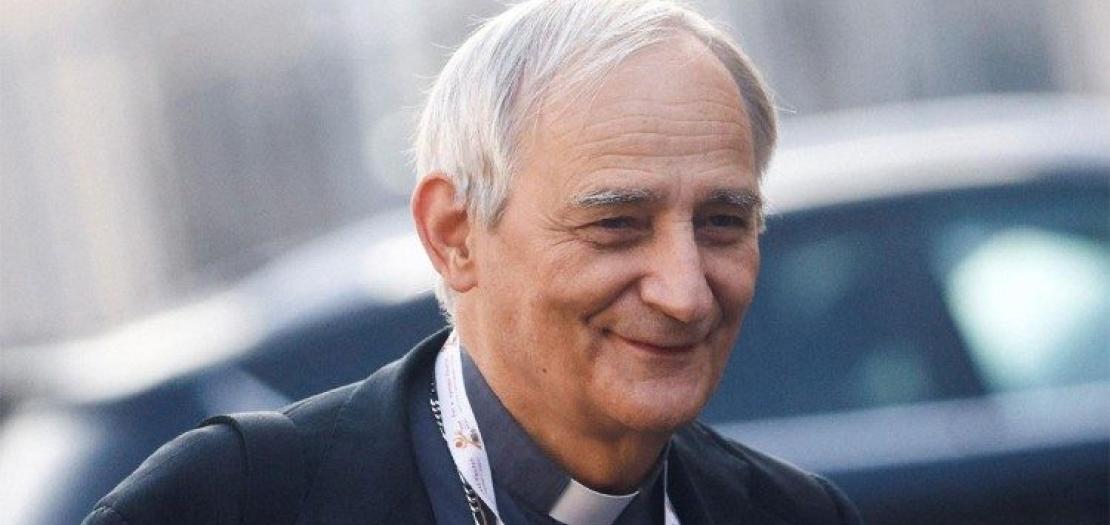
Following a meeting with the Russian Ambassador to the Holy See, Cardinal Matteo Zuppi, the President of the Italian Episcopal Conference, or CEI, visited the headquarters of Vatican News for an interview on the theme of peace.
The wide-ranging conversation begins with the words spoken by Pope Leo XIV on 17 June, when he received the CEI in the Vatican. On that occasion, the Pope offered a precise and profoundly timely clear instruction in light of the current era we are living, asking all Dioceses to develop a pastoral ministry focused on peace.
Q: Cardinal Zuppi, Pope Leo expressed appreciation for the 'schools of peace' initiative, an experience that already belongs to some Dioceses, but he specified that this is, in a certain sense, an urgent task for everyone. How did you receive the Pope’s words, and what, concretely, is being considered to put them into practice?
It is important, and I thank you for this, to find moments of dialogue, to be able to discuss these themes which today I would say are decisive and dramatic; because we cannot limit ourselves to an academic discussion on peace, which in the end would be a dialogue among those who are comfortable and are discussing how to be more comfortable; no, this is a tragic discussion, confronted with the many wars, with terrible violence, with the logic of rearmament—that is, of fueling wars—the logic of thinking that weapons are the only way to prevent war or to bring about peace.
Thus, I would say that the Pope’s invitation clashes with a situation that only the irresponsible can consider sustainable, and at times, it seems to me that there are irresponsible people, that there are those who, for example, always think that in the end everything will go well, who do not confront reality. And so, it would be irresponsible not to pose the problem of peace, while the Pope, as a responsible person, has asked us to make every community a “home of peace.” He used this very concrete and very effective expression: "home of peace."
What, then, is the commitment? First and foremost, it is that of prayer. As the Permanent Council of the CEI, on this point, we have indicated the occasion of Pentecost and, starting from there, the need to find other occasions as well to involve all our communities; Pentecost, in fact, is a moment to gather together, all nations united by the Spirit—the exact opposite of Babel—and we wanted this moment to become a great invocation for peace.
Therefore, prayer, and then welcome and solidarity. In welcoming, in fact, there is the antidote to violence, to war; and on the other hand, solidarity is indispensable to help those who are overwhelmed by the storm of war. I’ll give an example that involved many Caritas organizations with so much joy on the part of those welcomed and those who welcome: the children who came from Ukraine for a period of peace, a moment of peace away from war. And in particular I think of those who were received and welcomed by the children of the Estate Ragazzi [Summer Camp] of the Holy See in the Vatican, the beautiful initiative that has existed for years for the children of employees, thanks to the work of Father Franco Fontana. Not by chance, President Zelensky thanked the Pope for this welcome.
Q: The parish as a "home of peace" that can also be a “school of peace:” is education, then, the fundamental path, the one that cannot be evaded, for building peace?
Certainly, this is a beautiful message from the Day of Peace: education as the “name of peace.” Also because—one must be attentive—today, unfortunately, there is an education to war, which is that of violence, of hatred, of ignorance, of prejudice... I think of the “keyboard warriors”; in my opinion, this is a form of literacy, of education to war.
War, in fact, is never something that arrives suddenly, it is not a lightning bolt—if it is a lightning bolt, it is something that arises in an environment, and that happens because that environment has already overheated, has already been electrified, it has not received, precisely, the education to peace, which is exactly doing the opposite: making people know one another, creating bonds, respect, attentiveness, networks of encounter.
I believe it is very important, for a "home of peace," to engage daily in a small training exercise to counter the process that leads to the creation of “keyboard warriors” and instead initiate opposite processes in schools, in after-school programs, in parishes. I think of the beautiful examples of many after-school programs or many Italian language schools. Many parishes, many communities organize these schools because language is also the first way to make someone feel at home, to give them the key to the house.
Or I think of those children and young people who are, paradoxically, still considered foreigners when in fact they are the classmates of our own children, and so it should be our natural duty to help them, protect them, help them catch up where they are disadvantaged, obviously due to the environmental situation of their families. These signs that I see in many places, I believe, are the beginnings of that necessary “literacy” to create schools of peace. They are realities that live and foster encounter, the understanding of what is happening, because in reality there is so much ignorance and, therefore, so much polarization. We must therefore press the pedal of education, of knowledge, and thus of good information.
Q: War is not a lightning bolt, it never begins with the pulling of a trigger, but much earlier—it begins in the heart of man and has to do precisely with the hatred that grows, that is fomented. In this sense, the schools of peace open the way to possibilities of dialogue, of encounter, of fraternity, of mutual welcome, of not being afraid of the other—in short, to all the possible paths of peace. Pope Leo XIV, in speaking about peace, entered into a sphere that refers to the Church’s social doctrine. At times, one hears the criticism of those who maintain that instead of these themes, one should focus on the proclamation of the Gospel, that one should speak of God—as if dealing with and committing to these fronts were to take something away from the purity of faith and proclamation. I think of the commitment of the Popes, of the encyclicals of Pope Francis—Laudato si’ and Fratelli tutti, of the issue of the environment which Pope Leo has reminded us of very forcefully in these days—and yet these are seen as though they were “optional” aspects, which the Church may deal with, but also may not. But doesn’t this reduce faith to something disembodied? Doesn’t this evade the profoundly evangelical root of all this commitment?
The root is clear and lies in the fact that the Gospel enters into history and does not lead us out of history. What is the Church supposed to do? What does it do? It speaks of Christ; what has Pope Francis done? He has done nothing other than speak of Christ—he said so from the beginning in Evangelii Gaudium, where the first word points directly to the kerygma, the proclamation of Christ.
And to speak of Christ means to enter into history because there is a very close bond between evangelization and human promotion, between the Eucharistic table and the table of the poor, between preparing the Eucharistic table and preparing the tables of attentiveness to others. This union between love and truth, between evangelization and human promotion, must never be missing.
Sometimes human promotion comes a little first, and then one understands the Gospel; sometimes the Gospel comes first, and then you realize, your eyes open and you say to yourself: but I must love the least brother, understand that Jesus is in him—it is He whom I must visit, welcome, clothe, and I must try to remove the cause for which he is in that condition, without clothes. Between these two actions there is a profound unity. Sometimes the synchrony is not perfect, and there is a need to bring the two timings together, but the two timings are like those of the heart—the two heartbeats, systole and extrasystole: they go together. Love and truth, evangelization and human promotion are the two beats of the heart of the Church.
Q: Let’s return to Pope Leo XIV’s words about making parishes into "homes of peace." Can this invitation also be an opportunity to reflect on the nature of the parish, on its destiny, and on the need for change that must also affect the parish?
Yes, certainly, and I believe that parishes are already changing, especially in the central and northern parts of our country. By now, the single parish, in the singular, tends to be almost rare—rather, they are generally always parishes in the plural, and this also helps to grow in communion. “My single parish” no longer exists.
The point, however, is that the parish must truly be a home, and instead, sometimes we run the risk—we must acknowledge this—that parishes are anonymous places. The great challenge is to weave fraternity, to build community, to foster knowledge, the capacity for relationships.
How many times have we insisted on the theme of relationship, which, however, does not mean self-help groups. It is not just “spending time together,” it is not a condominium, but indeed a home. I deliberately use an expression dear to Pope Francis: a home where everyone can feel at home.
I believe this is the great challenge of all times, and today I would say even more so, in a world that isolates and pits us against one another. In Italy, one out of three households is composed of a single person—a number that is increasing—while the decline in birthrates often reduces the home to a studio apartment.
The Church, then, should be a place where the table is always large, and where everyone, even those who are alone, can find the place where they discover that, in reality, they have many brothers and sisters.
Q: Two months have passed since the election of Pope Leo, an election that was in some ways surprising. Even from a secular point of view, one should be honest and admit that there is something that escapes human explanation and is inexplicable. Indeed, the question arises of how it had been possible that 133 people, of different origins and languages, most of whom had never met, could, in less than 24 hours, elect the Bishop of Rome with such a broad majority. Starting from this historical fact, let’s also talk about these first two months of the pontificate…
I too share this reflection—to put it humorously: our algorithm is always the best, it’s unbeatable. The Spirit is the algorithm that sums them all up. Joking aside, I would say that undoubtedly this election has been a source of great joy—the joy of being able to give an answer to the expectation in a very, very short time.
These two months seem to me marked by much gentleness, much determination, and a desire to resume the journey—just as always happens with change. Tradition in the Church is something extraordinary, because it always manages, just as it must, to transmit what one has—in continuity, but at the same time, obviously, also in the differences proper to each Pope. I would say to each person: what applies to each of us also applies to every Pope.
That’s why it seems to me that these have been truly important months, which also take place within the context of the appointments of the Holy Year—this time filled with intense moments of sharing, of encounter, in which we are together also physically, resuming the journey together.
In this context, we accompany Pope Leo with our friendship, with our prayer above all, and with obedience. Because when I say that everyone must obey the Pope, I’m saying something true and important. Then there will be those who have a kind of obedience—how shall we say—a bit peculiar, that says: “Yes, okay, but only for what I agree with.” But that doesn’t work. One must always obey the Pope.
To obey and be with him, making him feel our closeness, and I repeat, in this context of the Jubilee, to seize the opportunity for everyone to understand the beauty of our journey, of this Jubilee that prepares for hope, that brings us hope.
In a world like today’s, I believe that the Holy Year, the Jubilee of Hope, is truly a great opportunity, to be lived with Pope Leo.


